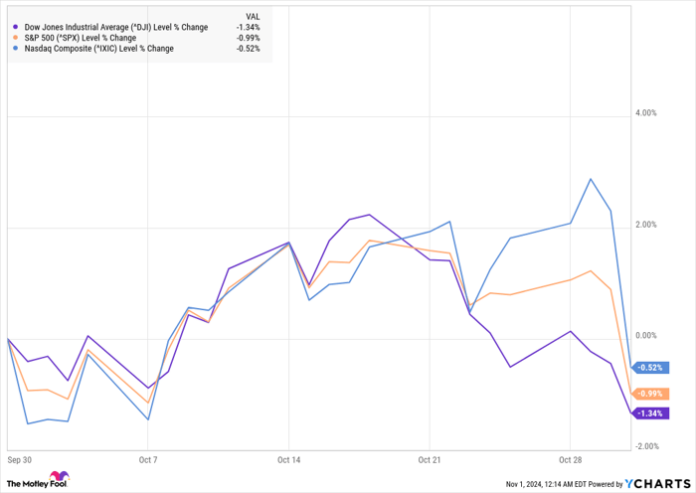October Ends with a Downturn: A Closer Look at Blue Chip Struggles
October wrapped up poorly for investors as lackluster earnings from Microsoft and Meta Platforms drove major indexes lower. Additionally, an accounting scandal involving AI server maker Super Micro Computer cast a shadow on AI stocks.
As illustrated in the chart below, the final day of the month saw the indexes drop into negative territory.

^DJI data by YCharts
Market declines can create potential buying opportunities. Let’s examine the three worst-performing stocks in October to determine if any of these established names are worth considering for investment.
1. Nike (down 12.8%)
Nike (NYSE: NKE) struggled last month as the sports apparel company reported another disappointing quarter. It has been losing market share to newer competitors while attempting to recover from decisions made under former CEO John Donahoe.
In September, Nike replaced its CEO with veteran Elliott Hill, who is tasked with stabilizing the company and sparking growth. Hill’s background in running Nike’s product and marketplace division gives hope that he can restore some of the company’s past strengths.
Improving its wholesale operations is critical, as Nike had chosen to focus primarily on direct-to-consumer sales, allowing competitors to gain ground. The brand also needs a fresh approach, as it has relied heavily on established styles.
Although there is potential for recovery, I’d like to see early signs of improvement before recommending it as a buy.

Image source: Getty Images.
2. Merck (down 9.9%)
Merck (NYSE: MRK) also faced difficulties last month. The pharma giant’s stock dipped as rising interest rates impacted dividend stocks, and Merck currently offers a yield of 2.9%.
Despite reporting solid earnings late in the month, Merck’s stock still declined. Quarterly revenue increased by 4% to $16.7 billion, surpassing analysts’ expectations of $16.46 billion.
Keytruda, Merck’s cancer-fighting drug, continued to drive sales, raking in $7.4 billion—about half of the company’s revenue. Adjusted earnings per share reached $1.57, beating estimates of $1.50.
However, sales for other drugs declined, increasing the risk of relying heavily on Keytruda for revenue. Given the slow revenue growth, Merck’s investment appeal remains weak even after last month’s decrease.
3. Dow (down 9.6%)
Dow (NYSE: DOW), a smaller player on the Dow Jones Industrial Average with a market cap of $35 billion, also struggled, dropping 9.6% in October.
The decline had various factors, with rising interest rates being a significant contributor as they often affect cyclical stocks tied to economic growth.
Dow’s net sales grew by only 1% for the quarter to $10.9 billion, fueled by a 1% increase in volume and flat pricing. Adjusted earnings per share dipped from $0.48 to $0.47.
Recently, Dow has lagged behind both the Dow Jones Industrial Average and the S&P 500, with little in its earnings report suggesting a turnaround. Nonetheless, dividend investors might find value in its current 5.7% dividend yield.
While the company did not provide specific guidance, it mentioned that a recovery in the economic cycle is underway and aims for over $3 billion in earnings by 2030.
Explore Promising Investment Opportunities
If you’ve ever thought you missed the chance to invest in top-performing stocks, here’s your opportunity to reconsider.
Occasionally, our analysts issue a “Double Down” stock recommendation for companies they believe are set for growth. If you think you’ve missed your chance, now is the time to act before prices rise. The data speaks volumes:
- Amazon: A $1,000 investment made when we doubled down in 2010 would be worth $22,292!*
- Apple: A $1,000 investment made when we doubled down in 2008 would be worth $42,169!*
- Netflix: A $1,000 investment made when we doubled down in 2004 would be worth $407,758!*
Currently, we are offering “Double Down” alerts for three outstanding companies, and this may be a rare opportunity.
See 3 “Double Down” stocks »
*Stock Advisor returns as of October 28, 2024
Randi Zuckerberg, who previously worked at Facebook and is the sister of Meta Platforms CEO Mark Zuckerberg, serves on The Motley Fool’s board. Jeremy Bowman holds shares in Meta Platforms and Nike. The Motley Fool also owns shares in and recommends Merck, Meta Platforms, Microsoft, and Nike. The Motley Fool suggests certain options: long January 2026 $395 calls on Microsoft and short January 2026 $405 calls on Microsoft. The Motley Fool follows a disclosure policy.
The views and opinions expressed herein are those of the author alone and do not necessarily represent Nasdaq, Inc.

